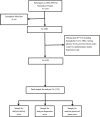Depression and Perceived Stress, but Not Anxiety, are Associated with Elevated Inflammation in an Obese Adult Population
- PMID: 32982507
- PMCID: PMC7490106
- DOI: 10.2147/RMHP.S270359
Depression and Perceived Stress, but Not Anxiety, are Associated with Elevated Inflammation in an Obese Adult Population
Abstract
Background: Anxiety, depression and perceived stress are risk factors for adverse health problems. Inflammation participates in the development of chronic diseases such as psychiatric disorders. This study explored the relationships between inflammatory biomarkers and depression, anxiety and perceived stress in an obese adult population.
Methods: The relationships between psychological scores and inflammatory markers were analyzed.
Results: A higher BMI was not correlated with a higher anxiety score (P=0.152); however, BMI was positively associated with a higher depression score (P<0.001) and a higher perceived stress score (P<0.001). Multivariate linear regression analysis revealed that in participants with BMI≥30 and 25≤BMI<30, depression and perceived stress were significantly and independently associated with ICAM-1, E-selectin and CRP, but these associations were not observed in participants with BMI<25. The anxiety score was not associated with any inflammatory marker in any group of subjects, as determined by multivariate analysis.
Conclusion: Depression and perceived stress were strongly associated with increased serum levels of pro-inflammatory markers, including ICAM-1, E-selectin and CRP, among a general obese population from the United States. These results further suggest that depression and perceived stress might also be chronic systemic inflammatory diseases.
Keywords: anxiety; depression; inflammatory markers; obesity; perceived stress.
© 2020 Zou et al.
Conflict of interest statement
The authors report no conflicts of interest for this work.
Figures
Similar articles
-
IL-6 and IL-8 are likely associated with psychological status in treatment naïve general population.J Affect Disord. 2022 Feb 1;298(Pt A):337-344. doi: 10.1016/j.jad.2021.10.042. Epub 2021 Oct 29. J Affect Disord. 2022. PMID: 34757072
-
The Relationship Between Global Sleep Score And Inflammatory Markers In Obese Adults From The United States.Nat Sci Sleep. 2019 Nov 5;11:317-324. doi: 10.2147/NSS.S220436. eCollection 2019. Nat Sci Sleep. 2019. PMID: 31807104 Free PMC article.
-
NUCB2/nesfatin-1 is associated with elevated scores of anxiety in female obese patients.Psychoneuroendocrinology. 2013 Nov;38(11):2502-10. doi: 10.1016/j.psyneuen.2013.05.013. Epub 2013 Jun 21. Psychoneuroendocrinology. 2013. PMID: 23796625
-
Immediate psychological distress in quarantined patients with COVID-19 and its association with peripheral inflammation: A mixed-method study.Brain Behav Immun. 2020 Aug;88:17-27. doi: 10.1016/j.bbi.2020.05.038. Epub 2020 May 19. Brain Behav Immun. 2020. PMID: 32416290 Free PMC article.
-
Anxiety independently contributes to elevated inflammation in humans with obesity.Obesity (Silver Spring). 2017 Feb;25(2):286-289. doi: 10.1002/oby.21698. Epub 2016 Dec 21. Obesity (Silver Spring). 2017. PMID: 28000423 Free PMC article.
Cited by
-
Perceived Stress and Interest in Non-Invasive Aesthetic Procedures During the COVID-19 Pandemic.Clin Cosmet Investig Dermatol. 2022 Jul 5;15:1247-1257. doi: 10.2147/CCID.S367001. eCollection 2022. Clin Cosmet Investig Dermatol. 2022. PMID: 35818390 Free PMC article.
-
Work Addiction and Depression, Anxiety, and Stress: the Mediating Role of Food Addiction Among Lebanese Young Adult Workers.Int J Ment Health Addict. 2022 Sep 12:1-21. doi: 10.1007/s11469-022-00909-8. Online ahead of print. Int J Ment Health Addict. 2022. PMID: 36119945 Free PMC article.
-
Effects of Sodium Benzoate, a D-Amino Acid Oxidase Inhibitor, on Perceived Stress and Cognitive Function Among Patients With Late-Life Depression: A Randomized, Double-Blind, Sertraline- and Placebo-Controlled Trial.Int J Neuropsychopharmacol. 2022 Aug 4;25(7):545-555. doi: 10.1093/ijnp/pyac006. Int J Neuropsychopharmacol. 2022. PMID: 35023557 Free PMC article. Clinical Trial.
-
Childhood adversities and the comorbidity between mood and general medical disorders in adults: Results from the WHO World Mental Health Survey Portugal.Brain Behav Immun Health. 2021 Aug 18;17:100329. doi: 10.1016/j.bbih.2021.100329. eCollection 2021 Nov. Brain Behav Immun Health. 2021. PMID: 34589816 Free PMC article.
-
Biological, environmental, and psychological stress and the human gut microbiome in healthy adults.Sci Rep. 2025 Jan 2;15(1):362. doi: 10.1038/s41598-024-77473-9. Sci Rep. 2025. PMID: 39747287 Free PMC article.
References
LinkOut - more resources
Full Text Sources
Research Materials
Miscellaneous



